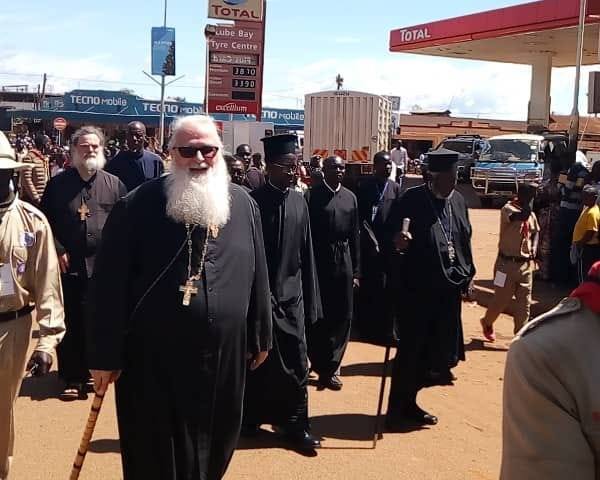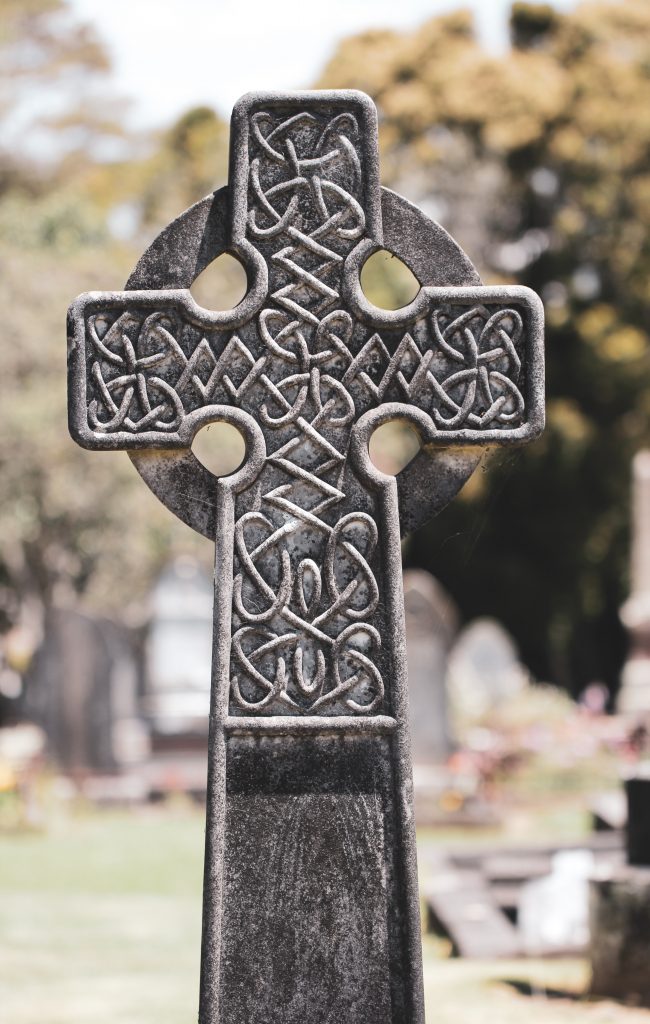
Question: Why do the Orthodox pray the prayer “Most Holy Theotokos save us!” during the liturgy and during their private prayers? Aren’t we saved by Jesus? Isn’t it blasphemous to ask someone else to save us?
Answer: “Most Holy Theotokos, save us!” is an Orthodox prayer, and a perfectly acceptable one. There are many others like it, some of which are directed to all the saints, and some to only one. Some are directed to Archangels and Angels. And in some services of the Church we have prayers directing one another to “save yourself”, or to our own souls to “save oneself” by almsgiving, by fleeing temptation, by giving away one’s worldly possessions, or by “fleeing the wrath to come.” We even, by apostrophe,* ask inanimate objects like the cross, or the blood of Christ, to save us.
*An “apostrophe” can mean “an exclamatory passage in a speech or poem addressed to a person (typically one who is dead or absent) or thing (typically one that is personified).”
All this can make Protestants, catechumens, and recent converts very nervous. As an Orthodox convert myself (many years ago), I get that. I wrestled with it myself for an extended period of time. The important thing to understand is twofold. The first is that, yes, we Orthodox really do mean those prayers. They are not mere rhetorical hyperbole, or getting carried away with affection for Jesus’s mom (as I heard one recent convert try to explain it). The second thing is equally important though, and a little bit more difficult to easily grasp, and that is that none of these prayers, just like none of the exhortations that we “save ourselves”, constitute a denial that our salvation is effected by God alone, or is intended to suggest that God and human agency are in conflict with one another. If a man on a desert isle prays that God save him, that doesn’t mean he refuses to accept a rescue from a passing trawler that sees his bonfire on the island. Nor does it mean that he fails to keep his signal bonfire lit. Nor, indeed, does he refuse to thank the captain and sailors of the ship for rescuing him, so as not to affront the honor of God who has “saved him.” In all that, he is wise, and entirely correct, just as he is that night when he falls down on his knees and thanks God for his great deliverance.
The underlying issue here is that in the Protestant west, a fierce emphasis on the unique authority and power of God, combined with the collapse of the traditional Christian metaphysical realism into late medieval nominalism, led, in the thought of such figures as Luther and, in particular, Calvin, to see God’s power, activity and salvific action as being the same as, or of the same sort as human activities, mere causal interaction intentionally willed. The only difference, as it were, was in the degree of power involved. This led to a belief that any robust sort of support for the reality of human agency or freedom was to posit limitations on God’s power and agency – that if any human could be said to genuinely participate in any way in their own salvation or the salvation of others, that meant that God’s power to save was thereby impugned. Unfortunately, this way of thinking about things is neither biblical or traditional, and openly conflicted with 1500 years of Christian verbiage and rhetoric, perhaps most notably here, in the business of the intercession of Mary and all the saints, and in the issue of the relationship between our own human agency and our salvation by God, a problem already acknowledged in Scripture itself.
Unfortunately, there is no way to address these problems as long as the one making the objection insists upon seeing God’s activity and human activity as being, in some sense, the exact same thing, on par with one another. But if God’s activity is not merely one amongst contending forces, but rather, is creatively constitutive of all such forces as are, then the problem goes away. God saves us by his divine, creative, and constitutive, uncreated energy, or grace, and we, creatively constituted by that energy for good works and deeds, actively and freely become one with salvation history, saving one another and ourselves not in conflict with, but as agents and elements of, God’s one salvific act. And no one so deeply or profoundly entered into that salvation stream as did Mary with her “fiat mihi” – “let it be to me according to Thy will.” So, given a Protestant understanding of things, the claim that Mary is a “co-redemptrix” is flat heresy, because it is a claim that Mary did something God did not. But in an Orthodox sense, it is not worrying language at all, really, as Mary was, genuinely and freely, a participant in our very salvation by God – not competitively, or alternatively, but as an actual constituent element of that salvation.
Mind you, many modern Orthodox share the same world view and metaphysical outlook as the Protestants around us, and so spend a lot of time trying to tone down or soft pedal the language that is traditionally used in the mistaken idea that it is mere rhetorical overkill, or something “mysterious” that we should hide to make Orthodoxy more palatable. This is, however, a lost cause. In the words of the Orthodox saints, common Orthodox prayers, and throughout the hymnody of the Church, we regularly ask Mary and the saints to “save us”, we call them co-sharers in the work of God. We tell people to save themselves, and we tell our souls to find salvation “through almsgiving,” or “by fleeing temptation” and the like. And Mary is openly called co-redemptrix and “source of our salvation”—not to mention the ubiquitous “Mother of our God” that still has so many Protestants worried. But understood as the Orthodox understand them, not one of these statements either limits God, or minimizes His sole creative act of salvation for the world He created and loves. It just means that He effected our salvation through secondary causes and agencies, some of which, like the wood of the cross and the nails hammered into his hands and feet, were not free to do otherwise than they did. Some other agents, like Pontius Pilate and the Jewish ruling authorities, participated against their will and apart from their intention, duped by the Supreme Wisdom of God, and participating in a way that ascribes no virtue to them for their participation in our salvation. But some participated constitutively in that salvation as free agents, and are worthy of praise and thanksgiving, for they have also “saved us” by what they have done. It is for this reason that we celebrate the communion of all the saints as God’s co-workers, and honor the angels as his servants. It is for this reason that we flee individualist language, speaking of “us” and “we”, not “me” and “my.” It is thus that we are saved, corporately, and together, as the Church, the very body of Christ. We are never alone, for God is with us, and He dwells in the prayers of all His saints.
– Fr. Casian Sibley
February 5, 2022
This post is included here by permission of Fr. Cassian. Fr. Cassian Sibley is a priest of the Russian Orthodox Church Outside of Russia, serving a parish he founded in Bryan, Texas. A graduate of HBU and the recipient of a Presidential Scholarship at Rice University, he studied Sociology, English Literature, Philosophy and Religious Studies. His current intellectual interests include Patristic Theology, Missiology, Eco-Justice, Civil Liberties, Aesthetics, and the unintended consequences of modern technology. He was raised in Malawi, Africa, went to boarding school in Kenya, and has continued to be engaged in church planting, college ministry, prison ministry, homeless ministry – and Orthodox foreign missionary work, most recently in Uganda. In addition to being a priest, Fr. Cassian has gained real life experience employed as a social worker, a caseworker for juvenile delinquents, a test car driver, a grant writer, a writing tutor, an organic gardener, a school teacher, an Aflac agent, a bilingual education tutor, a newspaper delivery technician, and a watercolor instructor. He owns five acres of almost entirely unimproved rural riparian-zone forest where he and his wife, Dr. Mat. Olympia Sibley, live in a couple of small eco-cottages, mostly off the grid. He paints and writes when he can.


